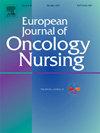Mindfulness-integrated Cognitive Behavioral Therapy reduces pain and psychological distress, and improves equanimity, hope and post-traumatic growth during breast cancer treatment: A pilot randomized controlled trial
IF 2.7
3区 医学
Q1 NURSING
引用次数: 0
Abstract
Purpose
The objective of this study was to evaluate the effectiveness of a shortened version of Mindfulness-integrated Cognitive Behavior Therapy (MiCBT) in managing pain and psychological distress (including depression, anxiety, and stress), improving equanimity, hope, and post-traumatic growth in patients with Stage I-III breast cancer undergoing chemotherapy.
Methods
A total of 42 women were randomly assigned to either an intervention group (n = 21) or a treatment-as-usual (TAU) (n = 21). All participants completed a battery of assessments for pain, emotional distress, hope, equanimity, and post-traumatic growth before and after the intervention, as well as at the 2-month follow-up. The intervention consisted of a short (4-week) MiCBT program, which involved progressive muscle relaxation, mindfulness of breath, body scanning, and the mindfulness-based interoceptive exposure task (MIET) for pain. The program was conducted over four consecutive weeks.
Results
Compared with the TAU group, at post-treatment, the MiCBT group experienced larger and significant reductions in pain (d = 1.58), psychological distress (d = .99), depression (d = 1.59), anxiety (d = 1.13), and stress (d = 1.68), as well as improvements in equanimity (d = 1.61), hope (d = 1.06), and post-traumatic growth (d = .6) (p's < .5). These differences remained significant at 2-month follow-up.
Conclusion
This study provides preliminary evidence that a four-week MiCBT intervention can improve the daily experiences of women with BC undergoing chemotherapy. Further research using larger samples and active control is needed to determine the generalizability of the results.
正念整合认知行为疗法在乳腺癌治疗期间减少疼痛和心理困扰,提高平静、希望和创伤后成长:一项试点随机对照试验
目的:本研究的目的是评估缩短版的正念整合认知行为疗法(MiCBT)在治疗I-III期乳腺癌化疗患者的疼痛和心理困扰(包括抑郁、焦虑和压力)、改善平静、希望和创伤后成长方面的有效性。方法42例女性随机分为干预组(n = 21)和常规治疗组(n = 21)。所有参与者在干预前后以及2个月的随访期间完成了一系列关于疼痛、情绪困扰、希望、平静和创伤后成长的评估。干预包括一个短(4周)的MiCBT项目,包括渐进式肌肉放松、呼吸正念、身体扫描和基于正念的疼痛内感受暴露任务(MIET)。该项目连续进行了四周。结果与TAU组相比,治疗后,MiCBT组在疼痛(d = 1.58)、心理困扰(d = 0.99)、抑郁(d = 1.59)、焦虑(d = 1.13)和压力(d = 1.68)方面有更大、更显著的减轻,在平静(d = 1.61)、希望(d = 1.06)和创伤后成长(d = 0.6)方面有改善(p's <;5)。在2个月的随访中,这些差异仍然显著。结论本研究提供了初步证据,表明为期四周的MiCBT干预可以改善乳腺癌化疗妇女的日常生活体验。需要使用更大样本和主动控制的进一步研究来确定结果的普遍性。
本文章由计算机程序翻译,如有差异,请以英文原文为准。
求助全文
约1分钟内获得全文
求助全文
来源期刊
CiteScore
4.40
自引率
3.60%
发文量
109
审稿时长
57 days
期刊介绍:
The European Journal of Oncology Nursing is an international journal which publishes research of direct relevance to patient care, nurse education, management and policy development. EJON is proud to be the official journal of the European Oncology Nursing Society.
The journal publishes the following types of papers:
• Original research articles
• Review articles

 求助内容:
求助内容: 应助结果提醒方式:
应助结果提醒方式:


